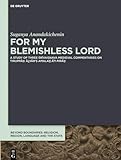For My Blemishless Lord : A Study of Three Śrīvaiṣṇava Medieval Commentaries on Tiruppāṇ Āḻvār’s Amalaṉ Āti Pirāṉ / Suganya Anandakichenin.
Material type: TextSeries: Beyond Boundaries : Religion, Region, Language and the State ; 11Publisher: Berlin ; Boston : De Gruyter, [2023]Copyright date: ©2024Description: 1 online resource (XI, 377 p.)Content type:
TextSeries: Beyond Boundaries : Religion, Region, Language and the State ; 11Publisher: Berlin ; Boston : De Gruyter, [2023]Copyright date: ©2024Description: 1 online resource (XI, 377 p.)Content type: - 9783110773170
- 9783110773231
- 296.1
- online - DeGruyter
- Issued also in print.
| Item type | Current library | Call number | URL | Status | Notes | Barcode | |
|---|---|---|---|---|---|---|---|
 eBook
eBook
|
Biblioteca "Angelicum" Pont. Univ. S.Tommaso d'Aquino Nuvola online | online - DeGruyter (Browse shelf(Opens below)) | Online access | Not for loan (Accesso limitato) | Accesso per gli utenti autorizzati / Access for authorized users | (dgr)9783110773231 |
Browsing Biblioteca "Angelicum" Pont. Univ. S.Tommaso d'Aquino shelves, Shelving location: Nuvola online Close shelf browser (Hides shelf browser)

|

|

|

|

|

|

|
||
| online - DeGruyter Völkerrecht / | online - DeGruyter Kleine Formen und Öffentlichkeit : Medialität des Politischen vom 19. Jahrhundert bis zur digitalen Gegenwart / | online - DeGruyter A Theory of Catastrophe / | online - DeGruyter For My Blemishless Lord : A Study of Three Śrīvaiṣṇava Medieval Commentaries on Tiruppāṇ Āḻvār’s Amalaṉ Āti Pirāṉ / | online - DeGruyter Kriegsgefangene oder Kriminelle? : Internierungslager, Gericht und Gefängnis im Nordirlandkonflikt 1968–1981 / | online - DeGruyter Lebensform Universität : Ehrengabe für Andreas Ranft / | online - DeGruyter Martin Heidegger: Holzwege / |
Frontmatter -- Acknowledgements -- Contents -- Preface -- 1. Introduction: The Amalaṉ āti pirāṉ -- 2. Commentaries and the commentators on the Amalaṉ -- 3. The commentarial techniques -- 4. Typical features found in the Śrīvaiṣṇava commentaries -- 5. The theological content in the commentaries -- 6. Concluding thoughts -- List of abbreviations -- A note on translation, transliteration, etc. -- Manuscripts and editions -- 7. Edition and translation -- Appendix 1. Periyavāccāṉ Piḷḷai’s commentary on the last two lines of Amalaṉ in his Rāmāyaṇa Taṉiślokam -- Appendix 2. A Recapitulation of the pramāṇas quoted by the commentators -- Appendix 3. A recapitulative table of parallels that Deśikaṉ draws between the Amalaṉ and the mantras -- Appendix 4. An Index of Quotations -- Manuscripts -- Bibliography -- Index
restricted access online access with authorization star
http://purl.org/coar/access_right/c_16ec
For my Blemishless Lord presents the text and translation of the exquisite poem Amalaṉ Āti Pirāṉ by Tiruppāṇ Āḻvār, which is part of the Śrīvaiṣṇava canon, the Nālāyira Divya Prabandham (6th – 9th centuries CE), together with the three Śrīvaiṣṇava commentaries in Tamil-Sanskrit Manipravalam (13th – 14th centuries) by key figures in the medieval religious history of South Asia, namely, Periyavāccāṉ Piḷḷai, Aḻakiya Maṇavāḷa Perumāḷ Nāyaṉār, and Vedānta Deśikaṉ. Offering the first fully annotated, complete translation of these exegetical writings, this volume analyses the language, commentary techniques, and theological positions of the commentators. Looking also at cultural, religious, and other allusions made by them, it places them in their literary, social, and religious backgrounds during a period of budding dissent within the Śrīvaiṣṇava community, to which they contributed at least in part. This rich resource is made available in English for the first time for students of Tamil and Manipravala, theology, religious history, and philology.
Issued also in print.
Mode of access: Internet via World Wide Web.
In English.
Description based on online resource; title from PDF title page (publisher's Web site, viewed 06. Mrz 2024)


